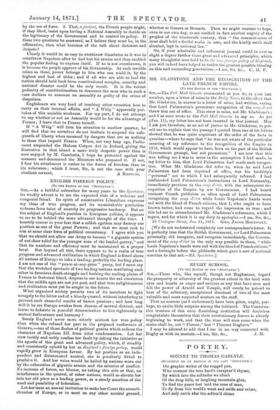ENGLISH FOREIGN POLICY.
[TO THE EDITOR OF THE " SPECTATOR.")
SIR,—As a faithful subscriber for many years to the Spectator, its weekly advent is to me the expected visit of a welcome and congenial friend. Its spirit of constructive Liberalism expresses my ideas of true progress, and its unmistakable patriotism redeems from taint of anarchy its progressive tendency. But on the subject of England's position in European politics, it appears to me to be behind the more advanced thought of the time. I heartily concur in your fear that a selfish egotism may destroy our position as one of the great Powers ; and that we must seek to aim at some clear form of political consistency. I agree with you that we should not allow our Army to become " a gigantic system of out-door relief for the younger sons of the landed gentry," and that its numbers and efficiency must be maintained at a proper level. But beyond all this, there appears to be a realm of true ;progress and advanced civilization in which England is fitted above ail nations of Europe to take a leading, probably the leading place. I am not one of the "peace-at-any-price " party, but I must say that the wretched spectacle of two leading nations mutilating each .other in ferocious death-struggle and bathing the smiling plains of France in fraternal blood, deepens in our hearts the sad conviction that the middle ages are not yet past, and that true enlightenment and civilization must yet be sought in the future.
What organized society permits two of its members to fight savagely to the bitter end of a bloody quarrel, without interfering to prevent such shameful results of basest passions ; and how long will it be ere Europe awakes from dreams of mutual distrust, and 'learns to federate in peaceful determination to live righteously in mutual forbearance and harmony ?
Surely England never more utterly mistook her true policy ,than when she refused her part in the proposed conference of ,Geneva,—one of those flashes of political genies which redeem the -character of Napoleon III. from utter condemnation. Let her now tacitly and nobly confess her fault by taking the initiative as the apostle of this great and advanced policy, which, if steadily and consistently upheld by her as England's foreign policy, would rapidly grow in European favour. By her position as an inde- pendent and disinterested neutral, she is peculiarly fitted to proclaim it. And her voice world be hailed by nations worn out by the exhaustion of gigantic armies and the miseries of conflict. No increase of forces, no bluster, no taking this side or that, no interference in the quarrel, of other nations, would so elevate her into her old place as a leading power, as a steady assertion of the need and possibility of federation.
Let her issue an annual invitation to make her Court the council- chamber of Europe, or to meet on any other neutral ground, whether at Geneva or Brussels. Then we might venture to hope, even in our own day, to see verified in fact another augury of the prophet of the nineteenth century, that " the common-sense of most shall hold a fretful realm in awe, and the kindly earth shall slumber, lapt in universal law."
Sir, if your admirable and influential journal could in ever so slight a degree further these great and advanced principles, which many thoughtful men hold to be the true foreign policy of England, you will indeed have helped to confer the greatest possible blessing on this and succeeding generations.--I am, Sir, &c., C. IL F.


































 Previous page
Previous page